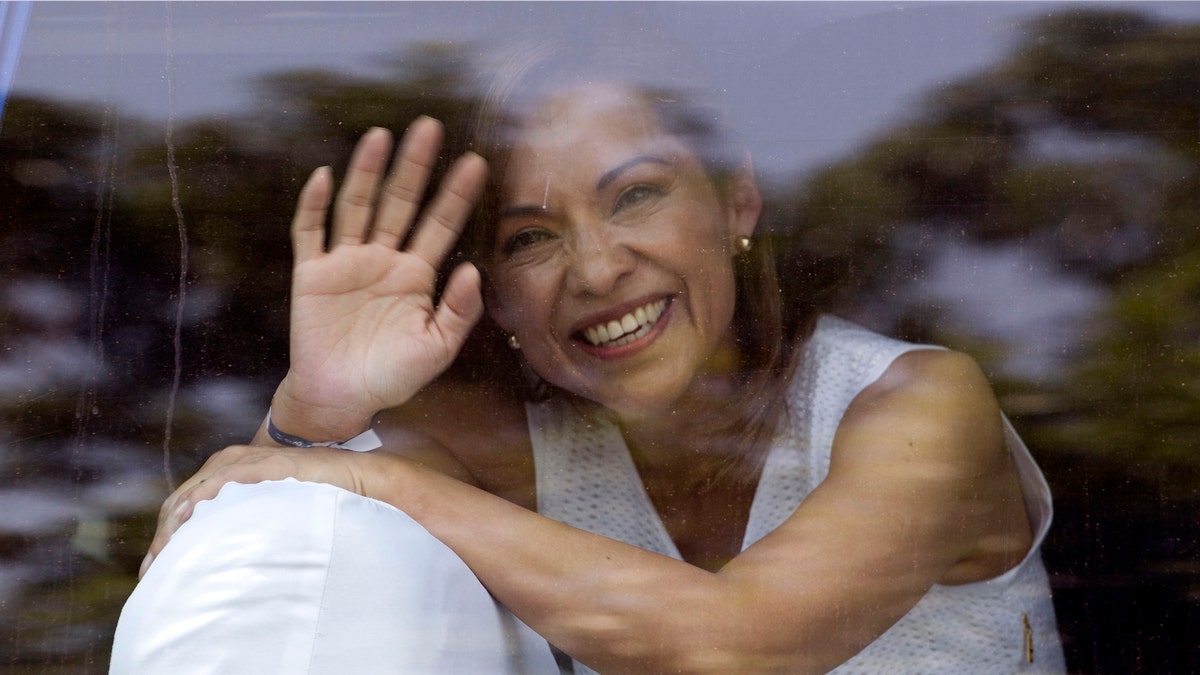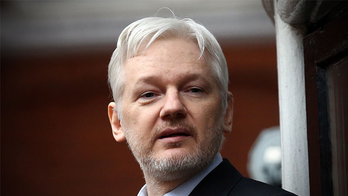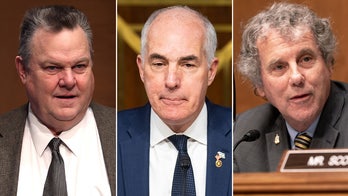
Josefina Vazquez Mota, Presidential candidate for Mexico's ruling PAN Party. ((AP Photo/Eduardo Verdugo, File))
MEXICO CITY – Cameras flashed and the crowd cheered as Josefina Vázquez Mota took the stage following her victory in a tough three-way race to become the ruling party's presidential candidate and this country's first woman to lead a major ticket.
Over the last 12 years, the tough-talking, workaholic economist had transformed herself from a motivational speaker and self-help author to one of the most powerful women in the country. She worked her way up from the lower ranks of the conservative National Action Party and scored a confident victory over two influential male competitors to win its presidential nomination.
With her daughters beaming behind her, the candidate pledged in February to become Mexico's first female president. Over the next weeks, she pulled within single digits of the front-runner in the July 1 election.
Then it all fell apart.
A series of gaffes and mishaps in the opening days of the relentless three-month march to the election halted Vázquez Mota's rise in the polls against Enrique Peña Nieto, the charismatic, 45-year-old candidate of the Institutional Revolutionary Party.
- Best Pix of the Week
- Budget Travel: Guadalajara, Mexico
- Archaeologists discover 2,000-year-old Mayan palace in Mexico
- Mexico City Fights Forest Fires, Shooters and Squatters
- Spring Break Tourism Surges in Mexico Despite Warnings
- Mexico’s Calderon Calls Cuba Visit a ‘Re-Encounter’
- Mexico President Felipe Calderon Says State Immigration Laws in US Are Unfair
- Kristian Ramos: US Must Stem Flow of Guns to Halt Mexico Drug War Violence
Her momentum lost, Vázquez Mota is now as much as 20 points behind Peña Nieto in many polls, weighed down by voter fatigue over economic hardship that some blame on President Felipe Calderón, also of the National Action Party, and his administration's grueling, nearly six-year-old war against drug cartels.
The candidate notes that polls still show about a fifth of voters still undecided.
"The goal is to go for a sector of important indecisive voters who will really define this election," she said in an interview with The Associated Press. "We began 40 points behind and we will make a sweep and overcome and get a very good victory."
Accustomed to winning and working so hard she has made herself sick at times, Vázquez Mota has bounced back from plenty of setbacks throughout her political career. But if the poll numbers hold, a landslide defeat would deal a painful blow to a woman who's carved out an unusually powerful position in a culture still imbued with machismo.
Mexican women have voted since 1953, but unlike other Latin American countries such as Argentina, Brazil, Costa Rica, Nicaragua and Chile, Mexico has never elected a woman president.
[pullqoute]
In a particularly bitter assessment by a fellow PAN member, former President Vicente Fox, who first recruited Vázquez Mota as a Cabinet member, proclaimed last month that "only a miracle" could save her race for the presidency.
It isn't just Fox. The entire political machine that brought Vázquez Mota, 51, into politics as an appointed member of Congress is being blamed for what many see as her likely defeat.
Some critics say divisions and disorganization within the PAN caused the logistical slipups in the campaign's opening days. Vázquez Mota has also struggled to reconcile voters' desire for change with the baggage of the ruling party's two consecutive presidential terms, in particular the offensive against drug cartels many blame for unleashing violence that has claimed more than 47,000 lives over the past six years.
She picked the single word "Different" as her slogan, then pulled veterans of Calderón's administration into her campaign after it ran into trouble. At some events, she has been confronted by voters angry about her party's past actions — run-ins broadcast over and over on TV.
"It seems to me that the fundamental problem is an identity crisis and that Josefina Vázquez Mota simply reflects that the party has lost the idea of what it's trying to achieve," said Jesus Silva-Herzog Marquez, a newspaper columnist and law professor who has closely followed her career and the PAN's fortunes.
Fox compares the party's strategy to a poorly trained athlete trying to compete in the Olympics.
"I believe in miracles," he said at a Wednesday meeting with foreign correspondents. "Sometimes you can flip a tortilla. But days are running out and I see fewer chances for a miracle to happen."
While hesitating to blame sexism for her poor poll numbers, Vázquez Mota said in the AP interview that gender has played a role in her troubles. She said she's been asked if she could serve as commander in chief while suffering from menstrual cramps, or have the strength to take on criminals.
"They'd never ask a man the questions that they ask me," she said.
The fourth of seven children of a Mexico City paint-store owner, Vázquez Mota trained as an economist and by the late '90s had become a newspaper business columnist. She was known mostly for her book with the deliberately provocative title "Dear God, Please Make Me A Widow," advocating independence as the best way for women to realize their full potential.
A devoted Roman Catholic who friends say attends Mass every Sunday, Vázquez Mota met her first boyfriend, Sergio Ocampo, as a high school student, married him and had three daughters. He is an executive at major tortilla maker Maseca and often attends campaign rallies with the couple's children.
Only three months after being named in 2000 to a congressional seat controlled by the PAN, Vázquez Mota was recruited by Fox to be secretary of social development, taking responsibility for disaster response and poverty-fighting efforts.
In 2002, she was hospitalized for a week with symptoms of dehydration and exhaustion after rushing to the Yucatan Peninsula to coordinate the rescue and emergency relief effort for 300,000 people made homeless by Hurricane Isidore. Three years later, Vázquez Mota lived for nearly four weeks on a military base in the state of Chiapas after Hurricane Stan hit that region, while other officials stayed in a hotel.
"I've always put myself intensely into my work," Vázquez Mota said.
In 2006, she joined the presidential campaign of Economy Secretary Felipe Calderón and, after he won, was named education secretary, the first woman to hold the important position.
Her political fortunes dropped when she clashed with another of Mexico's most powerful women, Elba Esther Gordillo, a Calderón ally who controls a key voting bloc as head of the national teachers union. Calderón demanded Vázquez Mota's resign in 2009, a firing seen as humiliating. Witnesses recall seeing Vázquez Mota's legs trembling so much she had to sit down as Calderon announced her resignation.
"Calderón's team treated her badly. They were extremely sexist," said Xochitl Galvez, a former commissioner for Indian affairs who became a close friend of the candidate. "It was one of her toughest moments."
Vázquez Mota recovered quickly, winning election to a congressional seat months later, then took a leave of absence to run for her party's presidential nomination.
By the beginning of March, one poll had Vázquez Mota within 7 percentage points of Peña Nieto, and some were anticipating a close race. That didn't happen.
In one speech, she mistakenly said she planned to "strengthen money laundering" if elected. The next day, a campaign rally had to be called off because of a nearby, unrelated picket line of striking airline workers — a cancellation her staff blamed on poor planning.
Shortly after, following a moderate earthquake that swayed the capital's high-rises, Vázquez Mota said she felt faint during a speech and interrupted her address to sit down and rest. The campaign dismissed the episode as a brief spell of low blood pressure, but images of her looking ill dominated television news for several days.
Known for speaking off the cuff for more than a half hour straight, Vazquez Mota is placing her comeback bets on two debates with Peña Nieto and leftist candidate Andres Manuel López Obrador. The front-runner has hewed tightly to his campaign script and been prone to gaffes when improvising.
Despite the long odds, Vázquez Mota and her staff are still hopeful.
"It hasn't been easy for her," said Agustin Torres, the social-networking coordinator for her campaign. "She's overcome many obstacles, and right now I see her going, and going, and not stopping."




